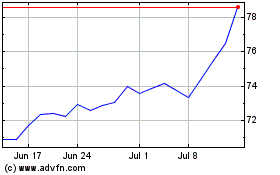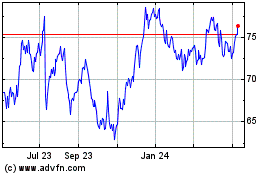FRANKFURT—The European Central Bank is expected to leave its
€1.8 trillion stimulus unchanged at its policy meeting on Thursday
despite a potential economic slowdown in the euro area in the wake
of Britain's vote to leave the European Union.
ECB President Mario Draghi has identified Brexit as a key risk
that could shave up to 0.5 percentage points off eurozoneÂ
economic growth over three years. Early survey data published
Tuesday shows German investors are very concerned about the
fallout.
But after years of monetary stimulus, economists say the ECB and
other central banks are running out of policy options. Last week,
the Bank of England surprised investors by postponing any response
to Brexit until August.
"The ECB is more and more short of ammunition," said Franck
Dixmier, Global Head of Fixed Income at Allianz Global Investors.
"They will have to …use [it] only in exceptional
circumstances."
Most economists expect Mr. Draghi to use his news conference on
Thursday to reassure investors of the ECB's ability to bolster the
economy again if needed. Many think the ECB president will signal
fresh stimulus is coming in September, when economic forecasts will
be available that factor in the impact of the U.K. vote.
"It's critical for the ECB to convince investors that it can act
again," Mr. Dixmier said.
The fallout from Brexit on the euro area remains unclear. An
initial bout of financial-market volatility has subsided. European
stock markets largely recovered from a sharp fall and yields on
10-year German government bonds returned toward zero. The euro has
risen sharply against the pound but fallen against the dollar.
Yet vulnerability lingers. Shares of Italy's largest banks
plunged by roughly 20% and haven't fully recovered. Italian
officials are negotiating with EU authorities over a possible €40
billion capital injection for the banks. The latest batch of EU
stress test results, due to be published on July 29, could reveal
further weaknesses in the sector.
Such problems "cannot be fully ignored by the ECB" when
designing its monetary policy, said Gilles Moec, an economist with
Bank of America Merrill Lynch in London.
Meanwhile the first eurozone indicator to be published since the
U.K. referendum—the ZEW index of German investor sentiment— slumped
to nearly a four-year low on Tuesday. ZEW President Achim Wambach
blamed Brexit.
The European Commission, the EU's executive arm, warned Tuesday
that the U.K. referendum would likely reduce the eurozone's gross
domestic product by up to 0.5% by 2017, due to heightened
uncertainty, and knock up to 0.25 percentage points off
inflation.
The ECB's challenge is that it has already done much to support
the eurozone economy. It has twice boosted monetary stimulus since
December, accelerated its bond purchases to €80 billion a month,
slashed interest rates further below zero and launched new
four-year loans for banks.
Despite that, eurozone inflation was just 0.1% in June, far
below the ECB's target of just below 2%. Top ECB officials have
urged investors to wait for the full impact of the bank's recent
policy measures to unfold.
"There's not a huge amount they can do of a new nature," said
Tim Graf, head of macro strategy for Europe at State Street Global
Markets. "On the [interest] rates side they're probably out of
options."
The ECB cut its deposit rateâ "charged for storing funds with
the central bankâ "to minus 0.4% in March, an all-time low.
Investors expect a further small cut in coming months.
But most economists argue that interest rates can't fall much
further. Europe's banks complain that negative interest rates
undermine profits and could lead to higher loan costs.
The other main stimulus tool is the ECB's bond-purchase program,
known as quantitative easing, which is currently due to expire in
March. With inflation so low, many economists expect it to be
extended soon, probably until September next year.
Any extension would raise fresh questions about whether the ECB
can continue to find enough bonds to buy—particularly German bunds,
whose yields have come under further pressure since the Brexit
vote. Under the rules of the program, the ECB only buys bonds that
yield more than its deposit rate of minus 0.4%.
"The main focus for markets [on Thursday] is if [Mr. Draghi]
comments pre-emptively on the scarcity of bonds," said Thushka
Maharaj, global market strategist at JP Morgan Asset Management in
London. "The ECB should start hitting constraints early next
year."
At their last meeting, policymakers noted market concerns about
bond scarcity, but said the purchases had been proceeding smoothly
so far, according to the minutes. To extend it much further,
though, economists say the ECB would need to change its design,
perhaps by increasing the bond issue limit, currently 33%, or
buying bonds that yield less than its deposit rate.
With the ECB's options limited, Mr. Draghi is likely to renew
his calls on governments to step in and spend money to support
growth.
"At this stage I think ECB policy is more a stabilizer for the
market rather than a stimulus in its own right," Ms. Maharaj
said.
Write to Tom Fairless at tom.fairless@wsj.com
(END) Dow Jones Newswires
July 19, 2016 09:35 ET (13:35 GMT)
Copyright (c) 2016 Dow Jones & Company, Inc.
State Street (NYSE:STT)
Historical Stock Chart
From Mar 2024 to Apr 2024

State Street (NYSE:STT)
Historical Stock Chart
From Apr 2023 to Apr 2024
